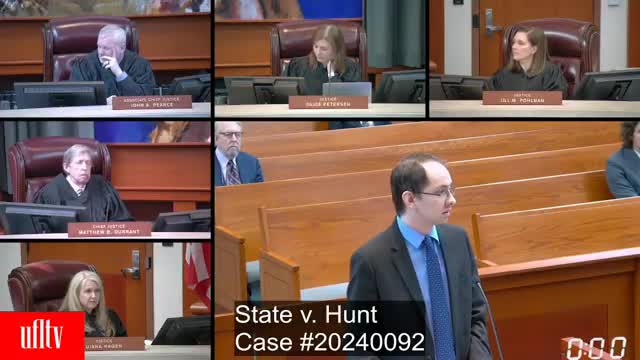Court Reviews Evidence Implications in State v. Verdi Shooting Case
July 20, 2025 | Utah Appellate Court Collection, Utah Family Law District Court Collection, Utah District Courts, Utah Judicial Branch, Utah
This article was created by AI summarizing key points discussed. AI makes mistakes, so for full details and context, please refer to the video of the full meeting. Please report any errors so we can fix them. Report an error »

The Utah Supreme Court convened on July 20, 2025, to discuss the case of State v. Hunt, focusing on the admissibility of evidence and the performance of legal counsel during the trial. The meeting began with a review of the arguments surrounding the presentation of evidence related to a violent crime, specifically addressing the emotional impact of audio recordings on the jury.
The discussion highlighted the state's responsibility to present a comprehensive narrative of events leading up to and following the incident. Legal representatives debated the relevance of certain evidence, particularly an emotionally charged audio recording, and whether it could be deemed prejudicial under Rule 403. One attorney argued that the recording was essential for illustrating the context of the crime, while another expressed concerns about its potential to unduly influence the jury's emotions.
Key points of contention included the probative value of the evidence presented and whether the absence of an objection from the defense constituted deficient performance. The dialogue emphasized that competent counsel should evaluate the emotional weight of evidence and its relevance to the case's overall narrative. The discussion also touched on the implications of the defendant's actions post-incident, suggesting that fleeing the scene could infer guilt.
As the meeting progressed, the court examined the completeness of jury instructions and the necessity for clarity in statutory language. The justices considered past cases, such as the Lewis case, to illustrate the importance of providing comprehensive definitions to avoid confusion in legal proceedings.
In conclusion, the court's deliberations underscored the complexities of balancing emotional evidence with legal standards, as well as the critical role of clear jury instructions in ensuring fair trials. The justices are expected to issue a ruling that will clarify these issues in the context of the ongoing case.
The discussion highlighted the state's responsibility to present a comprehensive narrative of events leading up to and following the incident. Legal representatives debated the relevance of certain evidence, particularly an emotionally charged audio recording, and whether it could be deemed prejudicial under Rule 403. One attorney argued that the recording was essential for illustrating the context of the crime, while another expressed concerns about its potential to unduly influence the jury's emotions.
Key points of contention included the probative value of the evidence presented and whether the absence of an objection from the defense constituted deficient performance. The dialogue emphasized that competent counsel should evaluate the emotional weight of evidence and its relevance to the case's overall narrative. The discussion also touched on the implications of the defendant's actions post-incident, suggesting that fleeing the scene could infer guilt.
As the meeting progressed, the court examined the completeness of jury instructions and the necessity for clarity in statutory language. The justices considered past cases, such as the Lewis case, to illustrate the importance of providing comprehensive definitions to avoid confusion in legal proceedings.
In conclusion, the court's deliberations underscored the complexities of balancing emotional evidence with legal standards, as well as the critical role of clear jury instructions in ensuring fair trials. The justices are expected to issue a ruling that will clarify these issues in the context of the ongoing case.
View full meeting
This article is based on a recent meeting—watch the full video and explore the complete transcript for deeper insights into the discussion.
View full meeting

